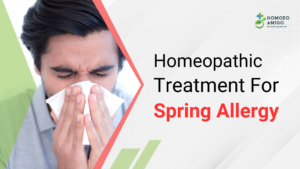
Homeopathic Treatment For Spring Allergy
As the weather changes, trees, grasses, and weeds release fine aerosol particles called pollen to fertilize other similar plants. However, pollen entering the nasal pathways could cause pollen allergy—with symptoms somewhat similar to the common flu and cold. As climatic variability increases, the urban environment is expected to significantly add to the burden of pollen-related respiratory and skin diseases. To address these issues, consider homeopathic treatment options for relief and management. Diseases that Can Occur During the Spring Season In spring, diseases such as asthma, rhinovirus, flu, Lyme disease, gastroenteritis, strep throat, allergic conjunctivitis, and insect allergies are prevalent. Asthma Asthma triggers include pollen, temperature changes, fertilizers, and insect repellents, which are abundant outdoors during this season. Additionally, indoor triggers such as dust, mold, and cleaning chemicals can also contribute to asthma symptoms. Asthma, being a chronic respiratory condition, can pose life-threatening risks, necessitating individuals with asthma to have a prepared emergency plan in case prescription medications fail to decrease breathing difficulties. Rhinoviruses Rhinoviruses, responsible for approximately 50% of all colds, spread easily during the spring, making regular hand washing and avoiding touching the eyes, nose, and mouth essential preventive measures. The flu remains a concern despite the warmer temperatures of spring, as flu viruses flow in moist conditions. Therefore, maintaining hand hygiene, especially while traveling, is crucial for preventing its spread. Lyme Disease Lyme disease-transmitting ticks are more active in warmer and wetter spring weather. Avoiding walking in tall plants and using tick repellents when outdoors are effective strategies for tick avoidance. Gastroenteritis Gastroenteritis, caused by noroviruses, also favors warm weather and is highly contagious. While symptoms typically last only 1-2 days, affected individuals remain contagious for up to 3 days after symptom resolution. Proper hand washing and sanitation practices are imperative for preventing stomach viruses, along with maintaining a healthy immune system through nutritious, vitamin-rich meals. Sore Throat Strep throat, easily transmitted through coughing, sneezing, and contact with contaminated objects, underscores the importance of preventive measures such as carrying disinfectant wipes and hand sanitizers when in public places. Allergic conjunctivitis, characterized by red or pink, watery eyes, may be mistaken for an infection. Seeking medical evaluation can help differentiate between allergic reactions and infections. Insect Allergies Insect allergies can result in pain, redness, itching, and minor swelling around the bite or sting site, which typically resolves within hours or days. However, severe allergic reactions, known as anaphylaxis, require immediate medical attention to prevent life-threatening complications. Anaphylactic symptoms may involve multiple organ systems, including the skin, mouth, lungs, heart, and intestines Practical Tips for Incorporating Homeopathy into Daily Routines Homeopathic medicines are derived mainly from plants, minerals, and animals, making them safer than other medical treatments. They are given in minute doses, ensuring they are non-toxic and safe for people of every age group. Homeopathy is fast-acting and effectively treats diseases from their root cause, restoring optimal health. Medicines which are derived from natural resources are effective for both chronic and acute diseases. Homeopathic treatment aims at removing and curing the root cause of ailments, providing long-term relief. Unlike allopathic treatments, homeopathy improves immunity by stimulating and restoring the body’s vital energy to heal. Intake of homeopathic medicine energizes the immune system, protecting individuals from future troubles. Homeopathy also serves as a preventive measure to maintaining a healthy safe and preventing various ailments The Connection Between Immunity and Allergies When an allergen enters the body, the immune system identifies it as a threat and releases antibodies to fight it. These antibodies trigger the release of histamine and other chemicals, resulting in allergic reaction symptoms like itching, sneezing, and swelling. The immune system’s exaggerated response to allergens can lead to chronic inflammation, which can contribute to conditions like asthma, eczema, and increase the risk of certain cancers. Allergies can weaken the immune system’s ability to fight infections by constantly activating it to combat allergens. This constant activation can exhaust the immune system, making it less effective against other pathogens and increasing susceptibility to infections like colds and flu. Overall, allergies significantly affect the immune system in both the short-term and long-term. While allergies cannot be cured, they can be managed with treatments such as antihistamines, immunotherapy, and decongestants. Avoiding exposure to known allergens and maintaining a healthy lifestyle can also help improve overall health and reduce the risk of developing allergies. Tips for a Healthy Spring Season Regular hand washing can prevent the spread of respiratory infections. If you’re prone to allergies, consult with a homeopathic clinic for appropriate homeopathic medicine and management strategies. Enjoy outdoor activities but be careful of potential risks. Protect your skin, stay hydrated, and be careful in unfamiliar outdoor environments. Follow proper food handling practices to prevent foodborne illnesses during outdoor gatherings. Use sunscreen to protect your skin from harmful UV rays and also be aware of potential irritants in plants.
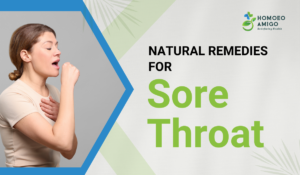
Natural Remedies For Sore Throat
Did you know, post-COVID-19, sore throats are increasingly common? Around 10 out of every 100 people face this challenge daily. Waking up with a sore throat and runny nose isn’t pleasant. Changing weather and air pollution contribute to these symptoms. Herbs, honey, and saltwater offer natural remedies. Homeopathy remedies are also effective with zero side effects. Importance of Maintaining a Strong Immune System Fast recovery periods: A strong immune system shortens the typical recovery time for infections from a week to 10 days down to just a few days. Minimal infection symptoms: With a robust immune system, symptoms of viral infections can be either significantly reduced or completely absent, even in environments where exposure is common. Quick physical healing: The immune system facilitates rapid healing of wounds, scrapes, and burns by promptly clotting blood near damaged areas and initiating the regeneration of skin cells Signs of Weakening Immunity Frequent colds and other respiratory infections: studies shows the average adult experiences 2-3 colds annually, some individuals suffer from more frequent respiratory infections. This increased susceptibility is often attributed to compromised immunity, leading to recurrent colds, flu, pneumonia, bronchitis, and sinus infections. Weaker immune systems, particularly prevalent among older adults and those with underlying health conditions like asthma, diabetes, and heart disease, are especially vulnerable, as observed during the current pandemic. Irregular digestion: Nearly 60% of the immune system resides in the digestive tract.. The microorganisms in the gut play a crucial role in defending against infections. When immunity is compromised, the risk of viral infections and autoimmune disorders increases, underscoring the importance of maintaining a healthy gut environment. Slow healing of wounds: The healing process of wounds relies on the prompt regeneration of healthy skin cells. In individuals with weakened immune systems, this regeneration process is impaired, resulting in slower wound healing. A robust immune system is essential for efficient damage control and healing of injuries. Stress: Prolonged stress has been shown to weaken the immune system, as highlighted by the American Psychological Association. Chronic stress reduces the body’s production of lymphocytes, white blood cells crucial for combating infections and illnesses. Managing stress is vital for maintaining optimal immune function and overall well-being. How Homeopathy can help support your body’s natural defenses Homeopathic medicine focuses on addressing the underlying imbalances causing an illness or condition, rather than just managing symptoms like traditional medicine. This approach targets the root cause for sustainable improvement in overall health. Homeopathic remedies are gentle and non-toxic, making them safe for people of all ages, including infants and pregnant women. Derived from natural substances, they have minimal risk of adverse reactions compared to many conventional medications. Homeopathy considers the unique individuality of each person by evaluating their physical, mental, and emotional state before prescribing a remedy. This personalized approach ensures that treatment addresses the person as a whole, leading to enhanced overall health and well-being. Tips on staying hydrated and getting plenty of rest during cold and flu season Get enough sleep: According to a study involving healthy adults, individuals who slept for less than 6 hours each night were more susceptible to catching a cold compared to those who slept for 6 hours or more. Adequate rest is crucial for strengthening natural immune health. Exercise regularly: even a single session of moderate exercise can enhance the effectiveness of vaccines in individuals with compromised immune systems. Regular moderate exercise has also been shown to reduce inflammation and promote the regeneration of immune cells. Eat a balanced diet: Incorporate a variety of vegetables and fruits into your diet to ensure a diverse intake of nutrients. Additionally, include lean proteins and complex carbohydrates such as brown rice. Avoid processed foods and excessive sugar consumption to support optimal immune function. Natural Remedies to get rid of a sore throat Marshmallow root: The gelatin-like substance in marshmallow root coats and lubricates the throat, providing relief for sore throats. Lozenges containing this substance are effective and nontoxic, even at high doses. Sage and echinacea: Sage has anti-inflammatory properties and can alleviate throat pain. Combining sage with echinacea, which fights bacteria and reduces inflammation, can enhance its effectiveness in relieving throat discomfort. Apple cider vinegar: Apple cider vinegar contains acetic acid, which has antibacterial properties. Mixing it with warm water and honey creates a soothing remedy for sore throats, though excessive consumption may lead to tooth decay and digestive issues. Saltwater gargle: Gargling with salt water helps reduce throat swelling and eliminates microbes. Dissolve a teaspoon of salt in warm water, gargle for 30 seconds, and repeat hourly for relief. Honey: Honey not only fights infection and provides pain relief but also improves the taste of remedies. However, it should not be given to children under 1 year old or those avoiding sugar. Honey can be added to warm water with vinegar or herbs for throat pain relief. Licorice root: Licorice root, similar to aspirin, reduces sore throat pain. Research suggests gargling with licorice water before surgery can decrease the risk of post-operative sore throat. Steep ground licorice root in hot water, strain, and drink for soothing relief. Sore Throat Remedies for Infants and Children Add a mist humidifier to the child’s room: Moisture in the air can mitigate sore throat pain by keeping the throat hydrated. A cool mist humidifier helps maintain optimal humidity levels in the room, providing relief for your child. Keep children hydrated: Encourage your child to drink plenty of fluids to stay hydrated. Avoid citrus juices or popsicles that can irritate the throat further. Opt for soothing liquids such as water, herbal teas, or warm broth. Use caution with cough drops: Children under 5 years old should not be given hard candy cough drops or any small objects that could pose a choking hazard. For children under 10 years old, use cough drops cautiously and supervise their usage. Avoid honey for children under 1 year old: Honey should not be given to

Natural Healthcare: Essential Tips for Skincare
Did you know that according to the Skin Cancer Foundation, the number of new invasive melanoma (a type of skin cancer) cases diagnosed annually increased by 32 percent by every year. Among them ratio of men is more than that of women. What’s even more concerning is that the majority of skin cancer is caused by exposure to the sun. In light of the above facts, it’s vital to know the importance of natural healthcare, particularly in skincare routines. No matter what your skin type is sensitive, dry, or oily a daily skincare routine can help you maintain overall skin health and improve specific concerns like acne, sunburn, and dark spots. How to Treat Skin Problems with Natural Healthcare When it comes to addressing skin problems without harming your skin, remember the one rule of skincare that is don’t pick. picking at acne, blackheads sunburn or other skin issues can result in darker skin spots called hyperpigmentation. These open wounds can lead to infection, increased acne, or scars. The deeper the wound the higher the dark spots can be. So it’s important to emphasize the importance of natural healthcare and homeopathy which is also a topmost choice for natural skincare approaches. By following these advice person can maintain healthy, blemish-free skin without causing further damage. Holistic Health Treatments for Skin Holistic skincare practitioners consider factors like diet, physical condition, stress levels, and hormonal imbalances. A balanced diet rich in proteins, fibers, healthy fats, vitamins, and minerals supports digestive health and reduces inflammation. Foods abundant in water, antioxidants, fiber, and vitamins support skin suppleness and elasticity. Excessive consumption of sugar, trans fats, fried foods, soft drinks, and alcohol harms skin and internal organs. Staying hydrated by drinking adequate water which is essential for skin health. Regular exercise reduces stress, balances endorphin production, and improves circulation. Managing stress through activities like meditation and yoga is crucial for skin health. Adequate sleep of at least seven hours nightly makes your skin rejuvenated and repaired. Relaxation techniques like daily exercise, herbal teas, and avoiding electronic gadgets before bedtime can improve sleep patterns. Adopting holistic health treatments to skin care can lead to radiant skin and overall well-being. Why choose Natural Health Care Center for Skin Problems Homoeo Amigo specializes in holistic health treatments, offering natural healthcare solutions for skin problems. Our clinics in Delhi-NCR and Kolkata provide expert consultations and the best homeopathy medicine. With a commitment to patient well-being and 100% transparency, our leading team ensures overall care for various skin conditions. Trust us for holistic health treatments and natural healthcare solutions.
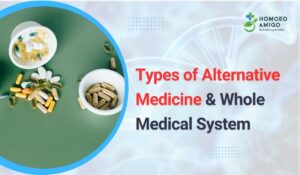
Types of Alternative Medicine & Whole Medical System
Did you know that India boasts a unique distinction of having six recognized systems of medicine all falling under the umbrella of alternative medicine? These systems include Ayurveda, Siddha, Unani, Yoga, Naturopathy, and Homeopathy. While homeopathy arrived in India during the 18th century, it seamlessly integrated into Indian culture and evolved like any other traditional system, earning its place as part of the Indian Systems of Medicine. In this blog, let’s explore these systems briefly. Ayurveda System of Medicine Ayurveda stands out among traditional Indian medicine systems because of its well-defined conceptual framework, which has remained consistent over time. Unlike other systems rooted in folk medicine, Ayurveda has evolved with a sophisticated understanding of health and disease, making it ahead of its time. One important aspect that sets Ayurveda apart is its integrated approach to health. It was among the first medical systems to advocate for considering all aspects of an individual’s well-being, including physical, mental, and spiritual health. Another distinguishing feature of Ayurveda is its philosophical foundation. Unlike other alternative medicine it primarily focus on the results of treatments, Ayurveda begins with a philosophical framework that guides therapeutic practices. This framework draws from Indian philosophies like Samkhya and Nyaya Vaisheshika, enriching Ayurveda’s understanding of the human body and its functions. Yoga The word “Yoga” originates from the Sanskrit term “yuj,” which translates to “to unite or integrate.” Yoga is centered around the union of an individual’s consciousness with the universal consciousness, serving as a comprehensive way of life. Maharishi Patanjali first outlined this system in a systematic manner in the Yogsutra. Yoga comprises eight components: restraint (Yama), observance of austerity (Niyama), physical postures (Asana), breathing control (Pranayam), restraining of sense organs (Pratyahar), contemplation (Dharna), meditation (Dhyan), and deep meditation (Samadhi). These steps in the practice of Yoga hold the potential to enhance social and personal behavior, promote physical health, induce tranquility, and foster serenity of mind and spirit by improving circulation and restraining the senses. Naturopathy Naturopathy is a holistic approach to health rooted in various cultures, focusing on natural healing methods. It emphasizes living in harmony with nature and promotes non-pharmacological therapies using natural materials. Naturopathy aims to boost the body’s self-healing capacity and encourages a lifestyle that aligns with the principles of nature on physical, mental, social, and spiritual levels. The focus of Naturopathy is not just on curing diseases or reducing symptoms but also on enhancing patients’ overall well-being by nurturing positive physical and psychosocial characteristics. This approach shifts from a disease-centered to a person-centered perspective, emphasizing strengths-based therapeutic relationships. Unani system of medicine The Unani System of Medicine originated in Greece and was further developed by Arabs into a sophisticated medical science, often referred to as Greco-Arab Medicine. It is based on the teachings of prominent figures like Buqrat (Hippocrates) and Jalinoos (Galen), who emphasized observation, experience, and rational principles in medical practice. These fundamentals remain relevant in modern medicine and science. The World Health Organization (WHO) recognizes the Unani System of Medicine (USM) as an alternative system to address the healthcare needs of diverse populations. Unani Medicine, also known as Arab medicine, draws on ancient traditional systems from China, Egypt, India, Iraq, Persia, and Syria. It is widely practiced worldwide as part of the broader spectrum of alternative medicine, offering holistic approaches to health and well-being rooted in centuries-old wisdom and practices. Siddha system of medicine The Siddha system of medicine, primarily practiced in parts of South India, especially in Tamil Nadu, shares similarities with Ayurveda but maintains its distinct identity. This system is deeply rooted in Tamil civilization and is closely associated with the term “Siddhi,” which means achievement. Siddhars, the practitioners of this system, were revered for their supreme knowledge in medicine, yoga, and meditation. This interaction between different medical traditions has led to the evolution and enrichment of the Siddha system, allowing it to offer unique approaches to healthcare. Today, Siddha medicine continues to play a significant role in South Indian culture and healthcare practices, preserving ancient knowledge while adapting to modern needs. Sowa-Rigpa Sowa-Rigpa, also known as Amchi’s medicine, is the traditional healing system of the Himalayan regions. Originating from India over 2500 years ago, it is deeply rooted in the Bodhi language, with “Sowa-Rigpa” translating to “Science of healing.” This ancient practice has played a crucial role in public health across various Asian countries, particularly in the Himalayan regions of Ladakh, Himachal Pradesh, Arunachal Pradesh, Sikkim, Darjeeling, and Tibetan settlements in India. HOMEOPATHY Homeopathy, codified by Dr. Christian Friedrich Samuel Hahnemann, emerged from observations made by physicians dating back to Hippocrates around 400 B.C. Hahnemann, a German physician, scientifically explored the phenomenon where certain substances could induce symptoms similar to those of a disease in healthy individuals. This exploration led to the fundamental principles of Homoeopathy. Introduced to India around 1810 A.D. by European missionaries, Homoeopathy gained official recognition through a Resolution passed by the Constituent Assembly in 1948 and subsequently by Parliament. The first principle, “Similia Similibus Curentur,” suggests that a medicine capable of producing symptoms in healthy individuals can treat similar symptoms in those afflicted by the disease. The second principle emphasizes administering one medicine at a time to a patient during treatment, while the third principle advocates for the use of minimum doses to induce a curative effect without adverse reactions.

Natural Healing for Heart Cardiac Disease – Exploring Homeopathic Solutions
Did you know that heart attack deaths in India have gone up a lot in the last three years? According to the study, it’s because of the lasting effects of the Covid-19 pandemic. The National Crime Records Bureau (NCRB) says there’s been a big 12.5% increase in heart attacks. Research highlights the fact that Getting good sleep is important for staying healthy, especially for your heart. Natural healing methods can improve your sleep and help your heart stay strong. What are the risk factors for Heart Disease? High blood pressure, high blood cholesterol, and smoking are significant risk factors for heart disease. Other medical conditions and lifestyle choices can also raise the risk of heart disease, such as diabetes, overweight or obesity, an unhealthy diet, physical inactivity, and excessive alcohol use. Symptoms of Heart Disease Chest pain related to shortness of breath is a common symptom of coronary artery disease (CAD). Angina pain is often described as pressure or heaviness behind the breastbone, radiating to the jaw and arm, accompanied by sweating and shortness of breath. However, angina can present with various symptoms, and chest pain may not always be present. Other symptoms may include backache, shoulder pain, upper abdominal discomfort, nausea, and indigestion. People with diabetes, the elderly, and women may experience different perceptions of pain or no discomfort at all. Instead, they may report fatigue, depression, weakness, and difficulty with physical tasks. Symptoms of decreased blood flow to part of the heart muscle may worsen over time as an artery narrows. In some cases, patients may not experience any symptoms until a heart attack occurs. Homeopathic Approach for Heart Diseases Homeopathy treats patients based on their symptoms, selecting medicines tailored to each individual’s unique condition. These medicines boost the patient’s immunity against the disease and treat it from the root cause. They not only help with heart attacks but also address risk factors like high blood pressure, high cholesterol, and diabetes. The duration of Natural Healing varies depending on the severity of the disease. Many people don’t choose homeopathic treatment for heart disease because they’re unsure about its effectiveness. They often opt for cardiologists and long-term medication due to a lack of awareness. Surgery is preferred for coronary artery disease, without realizing arteries could be blocked again later. While some consult homeopathy experts as a last resort, it’s not common Yes, homeopathy can be highly effective in many cases of heart attack, especially when started early or when the damage to the heart is minimal. It can also help manage cases after a heart attack, with heart tonics aiding in maintaining heart health. The dosage of homeopathic medicines varies from patient to patient and is determined by a qualified homeopathy physician. Homeopathy medicines have minimal side effects, if any, and are generally safe to use. It’s important to consult a qualified homeopathy doctor for proper guidance and management of the treatment.
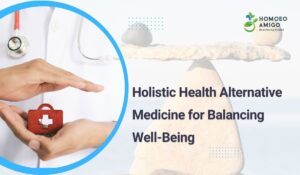
Holistic Health: Alternative Medicine for Balanced Well-Being
The roots of holistic health care stretch back to ancient times, credit goes to Hippocrates, the father of Western medicine. In his book, he highlighted the significance of “good bacteria” and the body’s inherent healing capacity. His philosophy opposed the use of chemicals to eradicate “bad bacteria” or enhance “good bacteria. In holistic medicine, a popular treatment is detoxification, which involves removing toxins from the body using natural herbs and plants. Various techniques are used based on the source of toxins. For example, toxins may result from consuming processed foods, polluted water, or being overweight. What is Holistic Health? The World Health Organization defines health as not just the absence of disease, but a state of complete well-being encompassing physical, mental, emotional, social, and spiritual aspects. So, what is holistic health exactly? It’s an approach to wellness that considers all these components. Holistic medicine, as a field, draws from diverse disciplines, religions, and cultures to promote healing on individual, community, and environmental levels. Homeopathy a Holistic Approach Homeopathy, an international system with holistic approach concepts, is practiced in over 85 countries worldwide, including Europe, Latin America, the United States, and Asia. Remedies in homeopathy are derived from various sources such as plant extracts, animal products, minerals, or inert materials. Manufacturing of homeopathic medicines is regulated by the Drugs and Cosmetics Act, of 1940, and the Drugs and Cosmetics Rules, of 1945. Established pharmaceutical companies adhere to strict Good Manufacturing Practices (GMP) set by the government. Additionally, homeopathy is recognized as a National system of medicine under the Homeopathy Central Council Act, 1973. Homeopaths embrace the interconnectedness of the body, mind, and emotions in health and disease. They utilize remedies customized to a patient’s physical, mental, and social aspects to stimulate the body’s innate healing abilities, guided by a holistic perspective. The public’s trust in homeopathy for treating both acute and chronic health issues is profound. Its strengths lie not only in disease treatment but also in disease prevention and health promotion. Homeopathic remedies have demonstrated effectiveness in conditions such as allergic rhinitis, asthma, back pains, migraines, allergies, and lifestyle disorders. Homeopathy offers standalone treatment or complementary therapy alongside other medical systems for various clinical conditions such as diabetes, hypercholesterolemia, thyroid disorders, and depression. Diagnosis is based on a comprehensive understanding of the patient’s medical history, temperament, personality, lifestyle, and dietary habits. The absence of side effects, the safety of the medicines, the ease of administration even for infants, and economic considerations make homeopathy an attractive choice for many. Furthermore, the personalized treatment options tailored for long-term diseases contribute to the increasing popularity of homeopathy
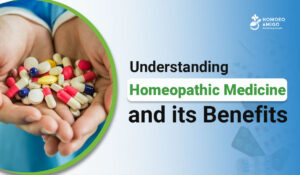
Understanding Homeopathic Medicine and its Benefits
According to A.C. Nelson reports, 62% of the population using homeopathic products prefer not to try conventional pharma products, and 82% of users are not inclined to switch to conventional medicine. 100 million people in India rely solely on homeopathy for their healthcare needs. Homeopathic medicines are made from natural substances, ensuring they are safe for people of all age groups and can be taken for a long period without any side effects. Homeopathy has no ‘one-size-fits-all’ treatment; it customizes treatment for all individuals based on an in-depth review of their health status, temperament, personality, likes, and dislikes. Homeopathy treats the whole person rather than just the physical symptoms, thereby correcting the condition’s root cause. For example, if you’re experiencing allergies due to weak immunity diabetes/thyroid due to genetic factors, or hair loss due to PCOS, homeopathy addresses the underlying cause. Key Principles in Homeopathy Homeopathy, developed in Germany over 200 years ago, is a form of medicine that believes in the body’s ability to heal itself. It uses highly diluted substances from natural elements to treat patients. There are three key principles in homeopathy: Law of Similars: This principle suggests that a substance causing symptoms in a healthy person can cure similar symptoms in an ill person. For instance, if someone has insomnia, a homeopathic remedy might involve a highly diluted solution of coffee. Single Remedy: Homeopathy emphasizes using a single remedy that covers all aspects of an illness—physical, emotional, and mental. This individualized approach aims to stimulate the body’s internal healing mechanisms. Minimum Dose: Homeopathic remedies use the minimum dose principle, starting with a small amount of a substance that is then diluted and shaken repeatedly. The belief is that this process activates the curative powers of the substance while eliminating toxicity. How Homeopathic Medicine Is Used? Homeopathic medicines often come in the form of sugar pellets containing diluted remedies, and they may also be in tablets, ointments, or gels. While scientific evidence is limited, some preliminary studies suggest homeopathy may help with various conditions such as allergies, arthritis, asthma, and stress. Homeopathic Treatments For allergies, different homeopathic treatments address specific symptoms: Allium cepa for a runny nose and watery eyes. Arsenicum album for sneezing and burning sensations. Euphrasia officinalis for burning tears and a non-irritating runny nose. Natrum muriaticum for headaches and nasal discharge. Sabadilla for itchy nose and violent sneezing. Wyethia helenioides for an itchy throat and ears or a sore throat with a hoarse voice.

Holistic Approach To Deal With Depression
In our busy lives, people often forget about their mental health. However, it’s important to recognize that mental health issue affect a significant portion of the global population. According to a study, over 300 million people worldwide, equivalent to 4.3% of the world’s population, struggle with depression. Transitioning to a closer perspective, in India, the National Mental Health Survey uncovered that nearly 15% of Indian adults require active intervention for mental health issues, with one in 20 individuals grappling with depression. Now, looking for solutions, homeopathy comes in. It’s a holistic approach to tackle mental and emotional issues like depression without side effects. Stress, anxiety, and depression are common, affecting your well-being and those around you. Homeopathy helps by addressing the root cause of depression and giving relief from feelings of sadness and hopelessness. Who Faces a Heightened Risk of Depression? People with low self-esteem and self-critical tendencies face an elevated risk. People exhibiting negative thinking are susceptible. Long-term stress puts individuals at risk. Women face a higher risk compared to men. Those with a history of mental trauma, such as the death of a loved one or abuse, are vulnerable. Individuals experiencing financial problems, difficult relationships, workplace issues, or divorce are at risk. Those with serious chronic illnesses like cardiovascular disease, cancer, or chronic pain are vulnerable. Individuals abusing recreational drugs and alcohol are at risk. People taking medications like sleeping pills, certain high blood pressure medications, and corticosteroids are at risk. Causes of Depression Genetics: Individuals with a family history of depression are at risk. Research is ongoing to identify the specific genes involved. Changes in Brain Chemicals (Neurotransmitters): Imbalances in neurotransmitters such as serotonin, dopamine, and norepinephrine, which regulate feelings, moods, and emotions, may contribute to depression. Hormonal Changes: Variations in hormone levels during pregnancy, postpartum, menopause, and thyroid dysfunction can trigger depression. Structural Brain Changes: Alterations in brain structure, including reduced activity in the frontal lobe, may be associated with depression. Coexisting Disorders: Conditions like anxiety disorders, post-traumatic stress disorder (PTSD), and bipolar disorder can increase the risk of depression. Chronic Illness: Individuals with chronic diseases, chronic pain, or long-term health conditions are more susceptible to developing depression. Holistic Approach to Depression Homeopathy, one of the most popular holistic approaches to medicine, bases its remedy selection on the theory of individualization and symptom similarity, employing a holistic approach. It is believed that complete health restoration can only be achieved by alleviating all signs and symptoms experienced by the patient. The goal of homeopathy is not solely to treat depression but also to address its underlying cause and individual susceptibility. Therapeutic medication for depression encompasses various remedies that can be chosen based on the cause, condition, sensation, and modalities of the complaints.
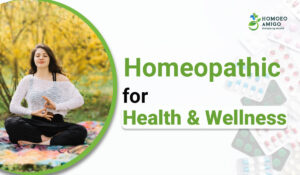
Homeopathy for Health and Wellness
Did you know that in India, roughly 5.8 million people lose their lives annually due to conditions such as diabetes, cancer, stroke, heart, and lung diseases? This means that out of every 4 Indians, 1 faces the risk of premature death from a Non-Communicable Disease (NCD) before reaching the age of 70. By focusing on enhancing the body’s innate healing mechanisms, homeopathic medicine aims to empower individual’s health and wellness to combat diseases such as diabetes, cancer, stroke, heart disease, and lung diseases. Through personalized treatment plans customizable to each patient’s unique constitution and health profile, homeopathy not only alleviates symptoms but also strengthens overall health and resilience. Homeopathy: Back to the Future Homeopathy’s journey from its origins in 18th-century Germany to its present prominence in India is a testament to its enduring appeal and effectiveness. Despite originating centuries ago, homeopathy has remained relevant and continues to be a significant component of healthcare in various parts of the world, especially in India. In India, homeopathy has experienced significant growth and acceptance over the years. With over a quarter of a million registered homeopathic doctors, India boasts the largest number of practitioners globally. This popularity is reflected in the significant portion of the population, around 10%, relying solely on homeopathy for their healthcare needs. Benefits of Homeopathy Homoeopathy offers a diverse range of products, including medicines, shampoo, oil, soap, powder, and ointment, accessible without a doctor’s consultation, similar to allopathic medicine. These over-the-counter remedies aim to address both symptoms and underlying causes of ailments. The homeopathic approach focuses on treating the root cause of diseases, enhancing the body’s natural healing ability rather than simply alleviating symptoms. This methodology aims to eradicate ailments at their core, a goal often considered unattainable by modern medicine. Homeopathic medicines undergo stringent quality control measures, minimizing adverse effects and ensuring minimal harm to the body’s internal systems. By excluding additives such as color, flavor, or extraneous ingredients, these remedies maintain purity and efficacy. Homeopathy is considered safe for individuals of all ages, including the elderly, children, and expectant mothers, according to its principles. Nonetheless, consulting a physician before starting homeopathic treatment is advisable for optimal health outcomes Treatment in Homeopathy In homeopathic medicine, the treatment approach differs significantly from modern medical practices. Unlike allopathic medicines, which primarily target symptom reduction, homeopathic remedies aim to bolster the individual’s health to combat the disease autonomously. Homeopaths meticulously examine the body to identify the cause and nature of the ailment. Subsequently, tailored prescriptions of homeopathic medicines and their dosages are provided, augmenting the body’s immune response against the specific disease. Transitioning from the cause of the disease, homeopathic treatments encompass a holistic approach, incorporating medications to combat infections alongside other therapies, including health and wellness. This comprehensive method has enabled the successful treatment of numerous common and severe conditions within the homeopathic medical system.
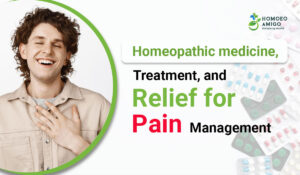
Homeopathic Medicine, Treatment, and Relief for Pain Management
Did you know that, low back pain affected a staggering 619 million people globally? The forecast is even more alarming, with an estimated increase to 843 million cases by 2050. This makes it a critical issue, emphasizing the need for effective Treatment. Homeopathy offers a holistic approach to pain management considering individual symptoms and promoting overall well-being. With its personalized treatment plans, homeopathy can be a valuable option for managing pain, especially given its effectiveness across various age groups. Why a Homeopathic Approach for Pain Management? Homeopathic remedies prove highly effective in addressing both general body pains resulting from exertion and those caused by specific conditions such as fevers or joint inflammation. This system of medicine prioritizes symptoms over pathological conditions when selecting the appropriate remedy, ensuring a consistent medicine set for various causes of body pains. A notable feature of using homeopathic medicines for body pains is their natural origin from plants and substances, serving as a side-effect-free alternative to conventional painkillers. Transitioning to homeopathy offers a holistic and symptom-focused approach to alleviating body pains, and promoting overall well-being. Homeopathic Medicines for Body Pains and Aches Rhus Toxicodendron: Effective for general body pains and aches helps in Pain management. Relief by walking worsens at rest. Recommended for overstraining or overstretching of muscles. Specific for body pains after getting wet in the rain. Arnica Montana: Excellent for sore, bruised body aches. Difficulty lying down calmly; bed feels hard. Addresses soreness and body aches due to overexertion. Effective for recent or old injuries. Bryonia Alba: Valuable for body aches from muscular or joint involvement. Worsening of body pains with slight motion. Better with absolute rest. Increased thirst for large quantities of water. Magnesium Phosphorica: Suitable for severe shooting, cutting, or stitching body pains. Almost unbearable pain; worsens with cold air exposure. Relief with warm applications and pressure. Ruta Graveolens: Effective for painful and bruised feelings in the whole body. Tenderness on parts in contact with a surface. Extreme weakness; difficulty rising from a chair. Why Homoeo Amigo? Homoeo Amigo, a reputable network of homeopathy clinics, is dedicated to providing top-notch pain management in Delhi-NCR and Kolkata. Our commitment to patient well-being is evident through 100% transparency in all interactions. We prioritize hygiene and spaciousness in our offices, creating a comfortable patient environment. Our professional team ensures a flawless and effective healing process with dedicated follow-up. At Homoeo Amigo, we pride ourselves on our friendly and caring approach to patient relationships, reflected in the term “amigo.” We understand the importance of trust, sourcing medicines directly from manufacturers, ensuring quality assurance through sealed packaging, and delivering with zero human intervention to eliminate any chances of foreign materials. Our high customer retention rate is a testament to the satisfaction and trust of our patients. For the best homeopathy treatment in Delhi, including Noida and Kalkaji, choose Homoeo Amigo for evidence-based healthcare solutions. Our clinics uphold the highest standards, and our commitment to your well-being. If you’re searching for the best homeopathy doctor in India or looking for a homeopathy medicine shop nearby, trust Homoeo Amigo for a reliable and caring healthcare experience.
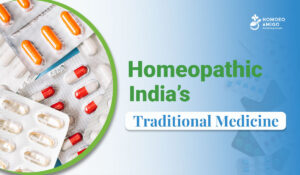
Homeopathy – India’s Traditional Medicine
Did you know that at present homeopathy holds is the third most popular method of medical treatment in India, ranking just after allopathy and Ayurveda. This recognition not only reflects the government’s acknowledgment of homeopathy but also highlights the diverse healthcare landscape in the country, where various traditional and alternative systems coexist alongside conventional medicine. HISTORY OF INDIAN TRADITIONAL MEDICINE Having its roots in India, traditional medicine has evolved continuously since the Vedic period. This ancient practice leans towards the preference for single crude drugs or blends, prioritizing them over the complexity of many-fold formulations. Despite the diverse origins and developmental timelines of these traditional medicinal processes, a common thread binds them through a shared foundation. In other words, the fundamental principles and practices of traditional medicine in India revolve around the utilization of plants and plant-based preparations in healthcare. While the origins and evolution times may differ, the underlying philosophy remains consistent across these diverse medicinal traditions. The emphasis on using natural elements for medicinal purposes reflects a holistic approach deeply embedded in the cultural and historical fabric of Indian traditional medicine Homeopathy: a complete system of medicine Homeopathic medicines aim to stimulate the self-regulatory mechanism for improving overall health. The focus is on reducing disease processes and susceptibility to illness universally, not limited to specific diseases. Often considered as a first option in certain medical conditions, potentially avoiding more costly and toxic treatments. Provides therapeutic alternatives when conventional treatments fail, are unavailable, contraindicated, or not tolerated. In many chronic diseases, homeopathic treatment can achieve remarkable results compared to conventional methods. Results depend on the extent of irreversible damage and the organism’s ability to recover. Homeopathy may be less suitable for conditions with severe irreversible damage, highly infectious diseases, or life-threatening situations. Specific surgical indications, deficiency diseases, and serious diseases with gross anatomical changes are better addressed by allopathic medicine. In incurable stages, homeopathic treatment can still provide relief to a significant extent. In injuries and accidents, homeopathic treatment is valuable and can complement surgical interventions. Homeopathic medicines, when used pre-and post-operatively, accelerate healing and counteract the effects of anxiety, shock, and anesthesia. Patients treated with homeopathy generally experience a more rapid post-operative recovery compared to those without such treatment. Conclusion Despite the diverse origins and developmental timelines of these medicinal traditions, a common thread binds them—a shared foundation centered around the use of plants and plant-based preparations in healthcare. This emphasis on natural elements for medicinal purposes reflects a holistic approach deeply embedded in the cultural and historical fabric of Indian traditional medicine.
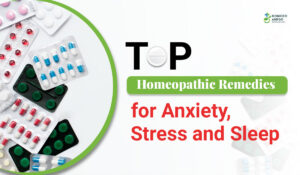
Top Homeopathic Remedies for Anxiety, Stress and Sleep
Did you know that anxiety disorders are the most prevalent mental health condition globally, impacting nearly 301 million people? It is concerning that only about 1 in 4 people with anxiety disorders seek and receive treatment for this condition. This underscores the need for increased awareness, understanding, and accessibility to mental health resources worldwide. Shockingly, a higher proportion of women experience anxiety disorders compared to men. From therapy to medication, top homeopathic remedies approaches can significantly alleviate symptoms and improve the quality of life for individuals dealing with anxiety. Homeopathic Approaches to Address Mental Health Disorders Common mental health disorders include anxiety, stress, and depression, often overlooked as mere products of the mind. Despite this perception, these disorders can significantly impact your health and overall quality of life. Homeopathy emerges as an effective treatment approach for anxiety, stress, and depression, boasting negligible side effects. Anxiety, characterized by a general sense of fear or apprehension, manifests in various forms such as general anxiety, phobias, and obsessive-compulsive disorders. Symptoms of anxiety are sporadic and lack a defined pattern. Homeopathy proves beneficial in treating anxiety once the underlying cause of the disorder is identified. Homeopathic Treatment For Anxiety Two commonly utilized homeopathic medicines for treating anxiety are: Aconitum napellus: Aconite is effective in addressing waves of anxiety or full-blown panic attacks. It benefits individuals experiencing fear, restlessness, and agitation, especially if they have recently encountered an accident or a natural disaster. Argentum nitricum: In cases where anxiety manifests as apprehension and nervousness about the future, Argentum nitricum (Arg-n.) is an effective homeopathic remedy. Anxiety in such instances may intensify in heated environments and crowded spaces. Top Homeopathic Remedies for Stress Problems Kali phosphoricum proves effective in addressing stress induced by overworking or illness. In such instances, the patient may exhibit jumpiness, oversensitivity, and difficulty coping with normal life. This homeopathic remedy works to relax the nervous system and can be utilized for treating stress-induced insomnia. Lycopodium serves as a suitable homeopathic treatment when stress leads to feelings of inadequacy and a tendency to pretend to be someone one is not. It is also beneficial in addressing irritability, crankiness, and social withdrawal resulting from stress. Homeopathic Medicine for Depression and Anxiety Mild depression, often mistaken for a simple bad mood, is frequently self-diagnosed. Depression can have various causes, including changes in the biochemical makeup of the brain. Here are a few homeopathic medicines for depression: Aurum metallicum: People focused on work who experience depression due to a perceived failure to succeed can find relief with Aurum metallicum. Symptoms may include feelings of humiliation and discouragement. Causticum: Depression stemming from grief or loss can be effectively treated with Causticum. This remedy addresses accompanying symptoms such as frequent crying, forgetfulness, and mental dullness. If you have specific concerns, consulting a homeopath for a free question is advisable. Does Homeopathy work for anxiety? Homeopathic remedies for anxiety operate in a gentle and effective manner, gradually alleviating the physical and mental stress associated with anxiety. They prove beneficial across a spectrum of anxiety intensities, from mild to severe. In the homeopathic approach, physicians delve into the individual’s psychology through conversation to facilitate complete recovery. Importantly, Top Homeopathic Remedies, being natural and non-habit-forming, eliminate the risk of drug dependency. In cases of chronic and intense anxiety, homeopathy proves valuable in symptom management, including the treatment of panic attacks. Aconitum Napellus stands out as an example of a natural medicine for anxiety. Furthermore, anxiety can stem from various sources, including health conditions, drug abuse, or withdrawal symptoms. Certain medical disorders like thyroid issues, heart problems, asthma, cancer, diabetes mellitus, and neurodegenerative conditions such as Parkinson’s disease may also contribute to anxiety. Homeopathy offers a holistic approach to addressing anxiety arising from these diverse factors Conclusion In conclusion, it is important to acknowledge that anxiety has become a prevalent medical condition nowadays, but there’s no need to exacerbate the concern with unnecessary worry. Alongside conventional allopathic treatment options, Top Homeopathic Remedies for anxiety have demonstrated remarkable efficacy. Although the treatment process is prolonged, individuals should exercise patience and persistence, as homeopathy delves deep into the root cause of the problem, aiming for efficient resolution. For those grappling with confusion about anxiety treatment, turning to Homoeo amigo is a prudent step. The experts at Homoeo Amigo guide individuals through the process, helping them discover the most suitable options. With this approach, there’s no need to scramble around searching for doctors and clinics.
